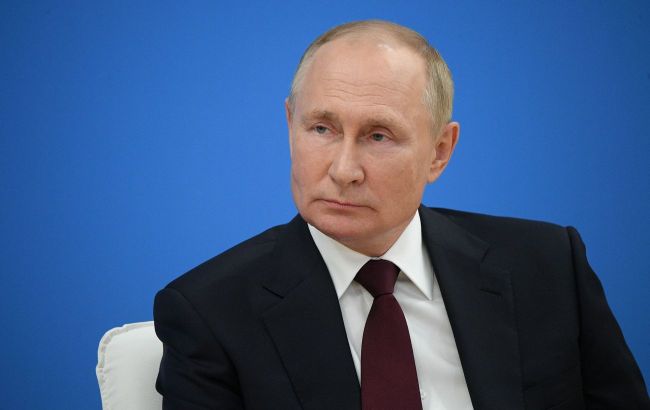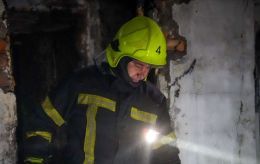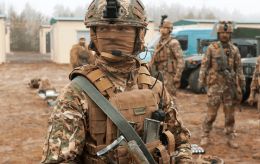Why NATO does not shoot down Russian drones and how Putin might use it: Expert opinion
 Photo: Vladimir Putin could use NATO's indecision to launch a targeted drone attack (Getty Images)
Photo: Vladimir Putin could use NATO's indecision to launch a targeted drone attack (Getty Images)
Recently, Russian strike drones fell on the territories of Romania and Latvia. In both cases, their air defense systems tracked the targets but did not intercept them.
For an analysis of why NATO countries have not yet intercepted Russian drones on their territory and what this might encourage Vladimir Putin to do next, see the material by RBC-Ukraine.
Contents:
- What happened in Romania and Latvia
- Why these countries aren't shooting down drones
- Is Romania preparing to shoot down Russian drones? What is known
What happened in Romania and Latvia
On September 8, the Air Force reported that a group of Russian strike drones attacking Ukraine had violated Romanian airspace. The country's Ministry of Defense confirmed that the drone entered Romanian territory and that F-16 fighters were scrambled.
According to Euroactive, at least two Shahed drones violated Romanian airspace overnight from Saturday to Sunday. One drone flew for over an hour before heading towards Odesa, while the other crashed in Tulcea County.
The next day, debris was found near the village of Periprava, opposite the town of Vilkovo in the Odesa region. No damage was reported, and the dangerous find was sent for examination.
Local opposition criticized the Romanian government for inaction. "In the spring, the head of the Army asked us to amend the legislation so we could shoot down drones entering our territory. Mr. Ciolacu, you control 60% of parliament—are you going to do something about it?" said USR party leader Elena Lasconi.
Romania's Foreign Ministry expressed a "strong protest" and called on Russia to cease attacks on Ukraine and to end the escalation at the border. NATO Deputy Secretary General Mircea Geoană condemned the incident, calling it potentially dangerous, but emphasized that there was no evidence of deliberate actions by Moscow.
Another Russian drone crashed in Latvia near the village of Gaigalava, 90 km from the Belarusian border. According to Army Commander Leonīds Kalniņš, it was a Shahed drone loaded with explosives.
According to LSM, the flight path was tracked to the crash site. Experts deactivated the warhead, and the investigation is ongoing. The military stated that the drone’s appearance is not considered an open military escalation against Latvia, as it was not targeted at the country. However, a decision has been made to strengthen air defense along the eastern border.
Russia uses drone provocations to destabilize NATO's eastern flank, intimidate the population with the threat of direct armed conflict, and hinder military assistance to Ukraine, according to the Center for Countering Disinformation at Ukraine's National Security and Defense Council. The lack of a strong response from NATO may reinforce the Kremlin's narrative of a "weak West."
Advisor to the Presidential Office, Mykhailo Podolyak, stated that Russia uses "salami tactics," discrediting the alliance with seemingly minor incidents. "They slowly escalate the conflict, trying to avoid the activation of Article 5 of the alliance’s mutual defense statute. The goal is to undermine the confidence of individual Alliance members and make them consider separate agreements with Russia," he said.
Why these countries aren't shooting down drones
Military expert and former spokesperson for the Ukrainian General Staff, Vladyslav Seleznov, describes the actions—or rather, inactions—of Latvia and Romania as entirely rational from a national security perspective. According to him, these countries believe that the Russian drones did not pose a threat to their military communications.
“They are trying to avoid being associated with the Russo-Ukrainian war. This is a key strategy for NATO member states: 'We are not involved and do not wish to be associated with the conflict,’” he explains.
However, this practice is quite questionable, as exemplified by Poland, which has already lost two of its citizens, Seleznov points out.
The reference here is to the incident in November 2022, when a missile crash in the village of Przewodów resulted in two deaths. Poland later stated that the missile was allegedly from Ukrainian air defense. If true, this means the Russian cruise missile maneuvered, and the tragedy would not have happened if not for the aggressor's attack.
“If they had acted proactively and used their air defense systems to destroy Russian missiles over Ukrainian territory, the debris would certainly not have fallen on Poland. Instead, Russian missiles are entering, turning around, and attacking our targets. On one hand, it is a military trick by Russia, and on the other hand, it reflects the military helplessness of our allies,” said Seleznov.
He believes that the unaddressed provocation in Latvia and Romania only encourages Putin to escalate tensions further.
“I think the next move will be a deliberate drone attack with minimal casualties. In this way, Putin will demonstrate that NATO's Article 5 does not work. All the talk about the most powerful defense bloc is far from reality. The biggest bureaucratic bloc is guaranteed to be NATO,” Seleznov added.
Regarding why Latvia and Romania have not yet taken action against the drones, he speculates that they might be trying to shift the decision-making responsibility to the alliance.
“And the alliance is simply stalling because it cannot creatively respond to the challenges it faces. Talking and expressing concern is something they can do, but they are incapable of more,” the expert concluded.
Military expert Mykhailo Zhyrohov explains that the failure to shoot down Russian drones is due to a lack of political will.
“A military decision in any country depends on political decisions. We see this now in Poland and Romania, that 'there is no need to provoke Russia.' Where there is political will, they shoot down. We can look at Belarus; despite my lack of respect for Lukashenko, there was a command to shoot everything down. In Poland and Romania, there was no such command,” he commented to RBC-Ukraine’s YouTube channel.
Is Romania preparing to shoot down Russian drones? What is known
The recent incidents involving Russian drones in Romania and Latvia have drawn the attention of the US White House spokesperson John Kirby stated that such events highlight the dangers the Russian war against Ukraine has brought to Europe. "The security landscape has changed, which is why we’re doing everything we can to make sure Ukraine can defend itself," he emphasized.
Lithuanian Foreign Minister Gabrielius Landsbergis described the incident in Latvia as a result of inaction and called for a strong response.
“Incidents unthinkable 3 years ago are now treated as routine. Nothing should be landing on Ukraine, or Latvia, or anywhere on NATO territory, but this is the new reality our inaction has allowed to emerge. Lithuania will of course be supporting a strong allied response,” he wrote on X.
Latvia has so far only summoned the Russian chargé d'affaires to express a categorical protest and has informed allies, NATO, the EU, and foreign ministers from other countries.
Meanwhile, Romania appears to be preparing for more decisive action. A meeting of the Senate Defense Committee is scheduled to discuss legislative changes that would allow the military to shoot down drones over the country. Previously, Senate President Nicolae Ciucă suggested signing a protocol with Ukraine to enable Romanian air defense systems to target Russian drones.
This indirectly confirms that neighboring countries are adapting their stance on the Russo-Ukrainian war to current realities, according to Seleznov.
"Note that our most ardent supporters are the Baltic countries, Poland, and several Eastern European nations. They understand that they are next if Ukraine does not hold back the Russian onslaught. We have two delusional neighbors, Hungary and Slovakia, who somehow consider themselves untouchable, but clearly, Putin dreams of a time when Eastern Europe was under Moscow's control. Our neighbors should not underestimate the threats, as underestimating often leads to catastrophic consequences,” he said.
Sources: statements from the defense ministries of Romania and Latvia, comments from Ukrainian, NATO, US, and other officials, and comments by military experts Vladyslav Seleznov and Mykhailo Zhyrohov.

